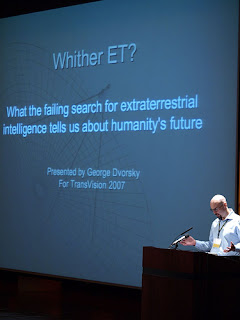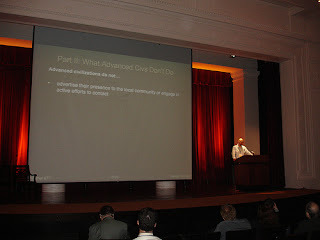This article is partly adapted from my TransVision 2007 presentation, “Whither ET? What the failing search for extraterrestrial intelligence tells us about humanity's future.”So, let’s try to figure out what’s going on. Given the Great Silence, and knowing what we may be capable of in the future, we can start to make some fairly confident assumptions about the developmental characteristics of advanced civilizations.
But rather than describe the possible developmental trajectories of extraterrestrial intelligences (ETI's) (a topic I’ll cover in my next article), I’m going to dismiss some commonly held assumptions about the nature of advanced ETI’s – and by consequence some assumptions about our very own future.
Advanced civilizations do not…
…advertise their presence to the local community or engage in active efforts to contact
As SETI is discovering (but is in denial about), space is not brimming with easily detectable radio signals. SETI’s work during the past 40 years indicates that the quest to detect signals will not be easy.
This problem is not as simple as it sounds. A common apology is that we’ve only recently started our search and we have only scratched the surface. The trouble, however, is that it would be no problem for an ETI to communicate with us if they wanted to.
To do this all they would need to do is seed the Galaxy with Bracewell probes (a self-replicating communications beacon). This scenario was explored in Carl Sagan’s Contact in which a Bracewell probe was lying in wait about 26 light years from Earth in the Vega system. The probe was activated by our radio signals, causing it to direct powerful radio signals at Earth – signals that would not be overlooked.
We know that no such object exists in our solar system or within a radius of about 25 to 50 light years. Our radio activity should have most certainly activated any probe lying dormant in our local vicinity by know. It is also reasonable to assume that if ETI’s embarked on such a communications mission that every solar system would likely have its own Bracewell probe.
Which in turn raises a more troubling question: if ETI’s could construct and distribute probes in this way, why haven’t they gone the extra mile and spread other types of self-replicating devices such as uplift or colonization probes?
…engage in any kind of megascale engineering or stellar re-engineering that is immediately obvious to us within our light cone
All stellar phenomenon that we have observed to this point in time appears ‘natural’ and unmodified. We see no clusters of perfectly aligned stars, nor do we signs of Kardashev III civilizations utilizing the energy output of the entire Milky Way.
As for our light cone, the Milky Way is 100,000 light years in diameter; given the possibility that our Galaxy has been able to support intelligent life for about 4.5 billion years, a 100 million year time lag (at its worst) is not severe enough to cause observational problems (except for distant Galaxies).
…colonize the Galaxy
Our Galaxy remains uncolonized despite the theoretical potential for advanced ETI’s to do so – namely the time and the technology. All that would be required is a self-replicating Von Neumann probe that proliferates outward at an exponential rate. Technologies required to build such a spacecraft would include artificial intelligence, molecular assembling nanotechnology, and an advanced propulsion scheme like anti-matter rockets, beamed energy, or interstellar ram-jets.
The reason for non-colonization is not obvious (hence the Fermi Paradox). In addition to technological feasibility there is the issue of economic and sociological imperatives for colonization.
…sterilize the Galaxy
Finally, some good news. We know the Galaxy is not sterile because we exist here on Earth.
Like the colonization potential, the prospect for an advanced ETI to sterilize the Galaxy exists through the use of berserker probes (a term attributed to Fred Saberhagen). These probes could steer NEO’s at planets, unleash nanotechnological phages, or toast planets with directed beams of highly concentrated light.
And like the Bracewell scenario, if a beserker was lying dormant in our solar system it should have destroyed us by now. If sterilization is the goal, there is no good reason for it to wait – particularly as our own civilization hurtles towards a Singularity transition.
Reasons for unleashing fleets of berserkers can be conceived, including xenophobic sociological imperatives or a malign artificial superintelligence (pdf). And all it would take is one civilization to do it. But as Robert Freitas has stated, "The present observational record can only support the much more restricted conclusion that no rapacious galactic civilisations are currently loose in the Galaxy."
…uplift or interact with pre-Singularity intelligences and biospheres
As a civilization that has been left to fend for itself, we have to assume that we, like any other civilization out there, goes it alone. No one is coming to help us. The Great Silence will continue.
Moreover, our presence on Earth and our civilizational development can be explained by naturalistic phenomena. Our existence and ongoing progress has been devoid of extraterrestrial interventions. If we’re going to survive the Singularity, or any other existential risks for that matter, it will have to be of our own devices.
…re-engineer the cosmos
A number of prominent futurists, a list that includes Ray Kurzweil and Hans Moravec, have speculated that the destiny of advanced intelligence is to re-work the cosmos itself. This has been imagined as an ‘intelligence explosion’ as advanced life expands outward into the cosmos like a bubble. The entire Galaxy would be re-organized with much of its matter converted into computronium. Eventually, it is thought that the laws of the Universe will be re-tuned to meet the needs of advanced civilizations.
Unfortunately, we do not appear to inhabit a Universe that even remotely resembles this model. The cosmos appears natural and unperturbed.
This is reminiscent of the God problem and the presence of evil. We live in a Universe that is hostile, indifferent and pointless. If advanced ETI’s had the capacity to re-engineer the Universe such that it was safer, more meaningful and paradisical they would have done so by now. By virtue of the fact that we observe such a dangerous Universe we should probably conclude that such a project is not an option.
In the final part of this series I will make an effort to explain why advanced civilizations don’t do these things and what they might be doing instead.

